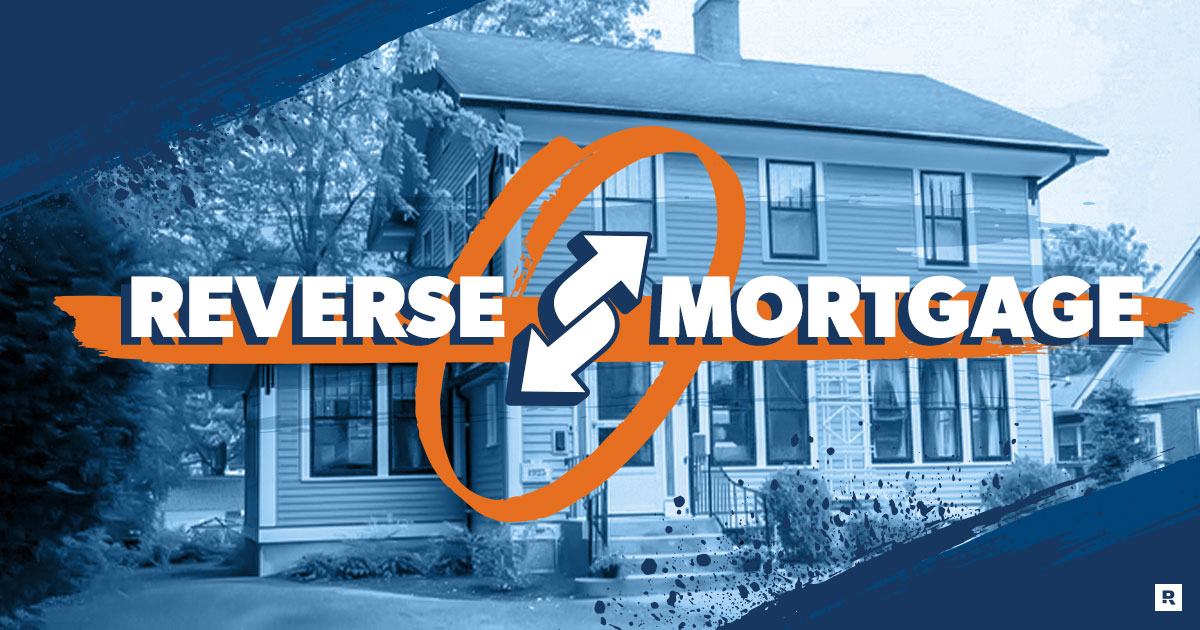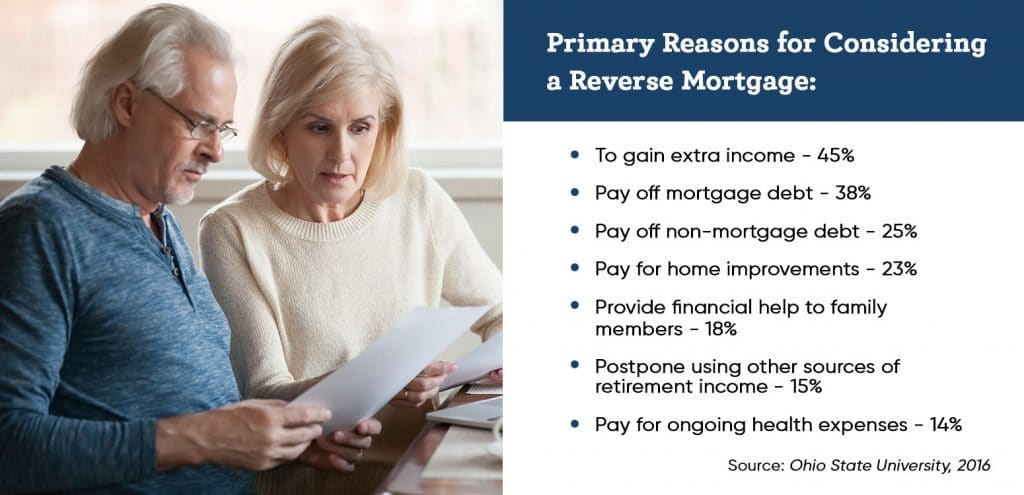How to Purchase Reverse Mortgage and Improve Your Quality of Life
How to Purchase Reverse Mortgage and Improve Your Quality of Life
Blog Article
Unlock Financial Liberty: Your Guide to Buying a Reverse Mortgage
Understanding the intricacies of reverse home mortgages is necessary for house owners aged 62 and older seeking financial liberty. This distinct financial tool makes it possible for senior citizens to leverage their home equity, transforming it right into obtainable money for various requirements, from medical care to way of life improvements. Nonetheless, navigating the qualification criteria, costs, and advantages can be complex. As you consider this alternative, it is crucial to comprehend not only how it works however likewise the effects it may carry your economic future. What are the essential factors you should evaluate prior to making such an impactful choice?
What Is a Reverse Mortgage?

The fundamental charm of a reverse home loan depends on its possible to boost financial flexibility throughout retired life. Property owners can utilize the funds for numerous purposes, including clinical expenditures, home improvements, or daily living expenses, therefore providing a safety web throughout an essential stage of life.
It is crucial to comprehend that while a reverse home mortgage permits enhanced money flow, it likewise decreases the equity in the home with time. As passion builds up on the exceptional finance balance, it is important for prospective customers to meticulously consider their long-lasting monetary plans. Consulting with an economic advisor or a reverse mortgage expert can give useful understandings right into whether this choice lines up with a person's monetary goals and scenarios.
Qualification Needs
Comprehending the eligibility needs for a reverse home loan is important for house owners considering this economic choice. To certify, applicants need to go to least 62 years of ages, as this age standard enables senior citizens to gain access to home equity without regular monthly mortgage repayments. Additionally, the house owner must inhabit the house as their key home, which can include single-family homes, certain condominiums, and produced homes satisfying particular guidelines.
Equity in the home is an additional vital requirement; homeowners typically require to have a substantial amount of equity, which can be determined with an evaluation. The quantity of equity readily available will directly affect the reverse mortgage quantity. Furthermore, candidates should show the ability to maintain the home, including covering home tax obligations, homeowners insurance policy, and maintenance prices, ensuring the residential or commercial property stays in great problem.
Furthermore, possible customers have to undergo a financial analysis to evaluate their revenue, credit report, and total financial circumstance. This assessment helps lenders determine the candidate's ability to meet continuous obligations connected to the home. Fulfilling these needs is critical for securing a reverse home mortgage and making sure a smooth monetary change.
Benefits of Reverse Home Loans
Many benefits make reverse home mortgages an appealing option for senior citizens looking to enhance their economic versatility. purchase reverse mortgage. Among the main benefits is the ability to convert home equity into cash without the demand for monthly home loan payments. Check Out Your URL This attribute permits seniors to accessibility funds for different demands, such as medical expenditures, home renovations, or daily living expenses, thereby reducing financial tension
In addition, reverse home mortgages give a safety net; elders can continue to live in their homes for as long as they meet the loan needs, cultivating stability during retired life. The profits from a reverse home mortgage can likewise be used to postpone Social Safety advantages, potentially resulting in higher payments later.
Furthermore, reverse home mortgages are non-recourse loans, suggesting that borrowers will never owe greater than the home's worth at the time of sale, shielding them and their beneficiaries from monetary responsibility. The funds obtained from a reverse home mortgage are usually tax-free, including another layer of monetary relief. Overall, these advantages placement reverse mortgages as a practical option for elders seeking to enhance their monetary scenario while maintaining their valued home setting.

Costs and Costs Entailed
When thinking about a reverse home loan, it's crucial to recognize the various expenses and costs that can redirected here impact the general monetary photo. Comprehending these expenditures is essential for making an educated decision about whether this monetary item is best for you.
Among the key expenses connected with a reverse home mortgage is the source cost, which can differ by loan provider but typically varies from 0.5% to 2% of the home's appraised value. Additionally, property owners need to expect closing expenses, which might consist of title insurance, appraisal fees, and credit history record charges, commonly totaling up to several thousand bucks.
Another considerable expenditure is home loan insurance costs (MIP), which protect the lending institution against losses. This cost is normally 2% of the home's worth at closing, with a recurring yearly costs of 0.5% of the continuing to be funding balance.
Finally, it is essential to take into consideration continuous costs, such as real estate tax, house owner's insurance, and upkeep, as the debtor stays in charge of these expenses. By very carefully reviewing these costs and expenses, homeowners can better examine the monetary effects of pursuing a reverse home mortgage.
Actions to Start
Getting begun with a reverse home loan involves a number of vital actions that can aid simplify the process and ensure you make notified choices. Examine your economic situation and determine if a reverse mortgage lines up with your long-term goals. This includes assessing your home equity, present financial obligations, and the requirement for added earnings.
Next, research study numerous lenders and their offerings. Try to find trusted establishments with positive reviews, transparent fee structures, and affordable rate of interest. It's vital to contrast terms and problems to find the most effective fit for your needs.
After picking a lender, you'll require to finish a detailed application procedure, which generally needs documentation of earnings, properties, and property details. Engage in a therapy session with a HUD-approved therapist, who will certainly offer insights into the effects and obligations of a reverse home mortgage.
Verdict
Finally, reverse home mortgages offer a feasible alternative for senior citizens looking for to enhance their economic stability during retired life. By transforming home equity right into available funds, house owners aged 62 and older click this can address different monetary demands without the pressure of month-to-month repayments. Recognizing the intricacies of eligibility, benefits, and connected expenses is necessary for making notified decisions. Cautious consideration and preparation can bring about improved high quality of life, making certain that retirement years are both safe and meeting.
Understanding the ins and outs of reverse mortgages is important for house owners aged 62 and older seeking financial flexibility.A reverse mortgage is an economic product created primarily for house owners aged 62 and older, permitting them to transform a portion of their home equity into money - purchase reverse mortgage. Consulting with a monetary advisor or a reverse mortgage expert can supply beneficial understandings right into whether this option lines up with a person's financial objectives and circumstances
In addition, reverse mortgages are non-recourse financings, indicating that debtors will never owe more than the home's value at the time of sale, safeguarding them and their successors from monetary responsibility. On the whole, these advantages setting reverse home loans as a practical option for elders seeking to enhance their economic situation while preserving their treasured home environment.
Report this page